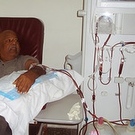Articles tagged with: Kidney Impairment
News»

Carfilzomib, which is a proteasome inhibitor under development as a treatment for multiple myeloma, has recently been shown to be a safe and effective treatment for myeloma patients with kidney failure, chromosomal abnormalities, or peripheral neuropathy. These results will be presented at the 51st American Society of Hematology (ASH) Annual Meeting and Exposition in New Orleans December 5 through 8.
Additionally, ASH presenters will examine the effects of carfilzomib in patients who have previously been treated with Velcade (bortezomib) and in patients who are receiving carfilzomib in combination with Revlimid …
News, Resources»

Research shows that approximately 20 percent of multiple myeloma patients develop kidney failure. Kidney failure occurs as a consequence of elevated calcium levels in the blood or when proteins called light chains are produced in excess - overloading the kidneys with protein.
Normally, the kidneys remove wastes, extra fluids, and minerals from the blood. But when they stop functioning, harmful wastes build up and this can cause other complications such as high blood pressure. Generally, kidney failure can worsen for multiple myeloma patients with fluid depletion, hypercalcemia, infection, nephrotoxic drugs (chemicals …
News, Resources»

For those with multiple myeloma, kidney impairment treatments may become a significant part of their myeloma treatment, affecting their daily lives. These treatments require an amount of time and care that may impact patients’ daily schedules and long-term plans.
Wherever a patient goes for treatment, the health care providers there will make sure his fluid intake is right for his condition. Often, patients will have to stay in a hospital overnight to be monitored and to receive other treatments, which might include certain drugs and intravenous fluids. (For more details on kidney …
News, Resources»

Kidney failure, which affects 20 percent of all multiple myeloma patients, is a serious complication that can lead to permanent kidney impairment and continued reliance on dialysis. However, a wide range of treatment options is available to myeloma patients experiencing kidney failure. Successful treatment methods include rehydration, correction of hypercalcemia (a condition that results in high serum calcium levels), and discontinuation of non-steroidal, anti-inflammatory drugs (such as aspirin or ibuprofen), that reduce blood flow to the kidneys.
A common complication found in myeloma patients experiencing kidney failure is hypercalcemia, a disorder that …
News, Resources»

Kidney failure, the inability of the kidneys to properly expel waste from the body, is a common side effect of multiple myeloma. Approximately 20 percent of all myeloma patients develop progressive kidney failure sometime during the course of their disease.
The signs and symptoms of kidney failure that often occur in myeloma patients include hypercalcemia and excess free light chains in the blood.
Hypercalcemia is a disorder that occurs when a myeloma patient’s affected or damaged bone dissolves and creates an overabundance of calcium in the bloodstream. The kidneys overwork while processing …
News»

Autologous hematopoietic stem cell transplants (auto-HSCT) may reverse kidney failure in one third of multiple myeloma patients, according to authors of an article published in the journal Biology of Blood and Marrow Transplantation.
Stem cell transplants are used to replace stem cells that are killed along with myeloma cells during chemotherapy. Transplantation of stem cells collected from the patient’s bone marrow before chemotherapy is known as an autologous transplant.
About 20 percent of patients diagnosed with multiple myeloma also suffer from kidney failure and five percent are dependent on dialysis.
This recent …
News»

A recent Phase 2 study, presented at the European Hematology Association (EHA) meeting, showed that a regimen of Velcade (bortezomib), dexamethasone (Decadron), and doxorubicin (Adriamycin), or VDD, resulted in improved kidney impairment in multiple myeloma patients.
Multiple myeloma patients often face kidney complications including acute light chain induced renal failure (ARF). ARF is a serious complication that can lead to permanent kidney dysfunction and reliance on continual hemodialysis. A normal kidney produces urine for excretion but reabsorbs proteins so they do not leave the body. Anti-myeloma therapy that prevents …

